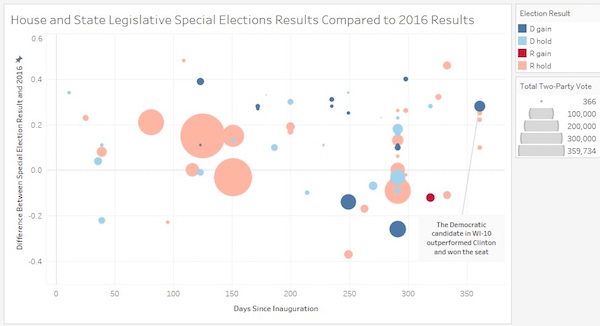On Tuesday night, Wisconsin Gov. Scott Walker seemed rattled. In a special election in the state’s 10th Senate district, Democrat Patty Schachtner beat Republican Adam Jarchow, taking over district that voted for Trump by 17 points in 2016. Walker responded by firing off a series of tweets that called the election a “WAKE UP CALL” and asked his followers to help him “spread the good news” about positive statewide educational and economic numbers. Walker is a savvy politician. He won three consecutive gubernatorial elections in purple Wisconsin while amassing a solidly conservative record on policy. So it’s not hard to imagine that this election – and Walker’s reaction to it–will cause other top Republicans across the country to worry about their prospects in 2018.
So should this election result worry Republicans?
Yes and no. No party should panic about a midterm wave based one individual state legislative special election. But the results in Wisconsin’s 10th District are part of a broader pattern that should make the Republican party seriously worry about their chances in November.

This graphic might look complicated, but it’s telling a simple story. Republicans have, on average, been underperforming Trump in special elections since his inauguration, and the election in Wisconsin’s 10th District is no exception (data is from this Daily Kos Elections spreadsheet and the sources they link to)
Specifically, in most congressional and state legislative special elections (each one is a point), Democrats outperformed Hillary Clinton’s 2016 showing (points that are higher indicate a greater Democratic overperformance; points that are lower indicate that the Republican outperformed Trump). In Wisconsin’s 10th District, that overperformance resulted in a Democratic pickup (points colored in dark blue), but Republicans have been underperforming in many seats that they still managed to hold (colored pink). Tuesday’s special election didn’t feature as many voters as some other contests (the size of the vote is proportional to the total number of votes for both major party candidates), but the sum of the evidence from relatively small contests can give us a window into what might happen in the midterms.
In other words, a Democratic overperformance in this election shouldn’t come as a shock. Democratic voters have been energized since Trump took office, and candidates have outperformed Hillary Clinton in numerous 2017 special elections.
That being said, it’s not hard to see why this loss in particular stung. In 2017 Democrats outperformed Clinton by 10 points on average, but Schachtner outperformed her by more than 20 points. Moreover, Wisconsin Republicans may have believed that they could hold this seat despite a strong Democratic performance. Trump won the district by 17 points in 2016, and Sheila Harsdoft (who left the seat to become the state’s agriculture secretary) won it in the same election by 26 points. It’s not hard to imagine that Walker and Wisconsin Republicans believed they could win even if Democrats overperformed by a significant amount.
Taken by itself, this race doesn’t change much about the outlook for 2018. Democrats are still ahead by a large margin in generic ballot polls, President Trump’s approval rating is low and Democrats are, on average, doing well in special elections. That doesn’t mean that Republicans are destined to be caught up in a wave. Voters have been warming to Trump’s tax bill somewhat, and it’s possible to imagine scenarios where he proposes more popular policies, takes more credit for the solid state of the economy, improves his numbers on leadership and empathy and mitigates losses in November.
But Democrats are still the favorites to control the House in 2019. And this election— like the Virginia gubernatorial election, House elections in Kansas, South Carolina, and Montana, and the Alabama Senate race—shows that Republicans have some problems that they need to solve if they’re going to hold onto the House.

